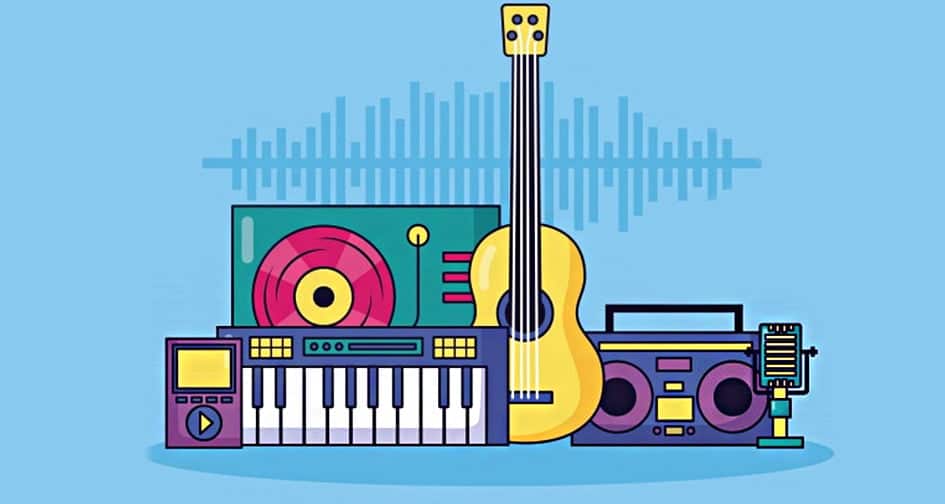Brief History of Music
Music has been a part of human culture for as long as human beings have existed on the planet. This fact is ascertained by the discovery of rudimentary flutes made from animal bone dating back to the time when Cro-Magnon man walked upon the earth. Music is something that was passed down from an ancestor even older than the earliest known human civilization. This artform has had a significant social-economic value in human culture, including religious and ceremonial roles as well as a source of entertainment. From its humble origins with primitive man, music has evolved and morphed into multiple genres that have been able to infiltrate every aspect of modern life.

Music in the modern era
Music has become a popular channel for self-expression a fact the profusion of music genres affirms. However, is self-expression the reason why this ancient art form has found its way into gambling? Self-expression might tie gambling and music together, but it is far from being the only relevant connection. Researchers are only now grappling with the tip of the iceberg when it comes to understanding the power of music.
Serious research into the effects of music on human thought and behaviour began in the 1950s when the field of music therapy was established. Medical researchers would set up experiments where patients with different ailments would be subjected to varying genres of music. Music therapy went on to evolve over the years into a more precise field that came to be known as musicology.
Numerous studies in the field of musicology have demonstrated that music does have anxiolytic properties. The implication is that music can significantly alleviate symptoms of anxiety and stress. There are claims that it also possesses analgesic qualities in that it can help lower the intensity of pain. This two positive attributes of music are why it is used in health-care facilities to help patients relax and as a non-verbal counselling tool. Do these relaxing effects of music affect you while you gamble?

A relaxed state of mind is undoubtedly a beneficial effect of listening to music while gambling. However, scientists are still baffled at how music can bring about positive change in human thought and behaviour. The next section of this article will try to determine whether there is actual truth to the claims made concerning the effects of music.
The Music-Brain Connection
Scientists have been able to conclusively determine that any possible links between music and its ascribed positive effects are to be found in the brain. It turns out that the brain processes music differently than vocal sound. When you listen to music, the auditory signals that reach your brain from your ears cause it to release certain chemical compounds. These compounds are produced in some areas of the brain. They then enter the rest of the body via the blood. It is important to note at this point that this sequence of events is not dependent on the activity. The implication is that you will experience these same effects regardless of whether you are gambling or bowling. The critical element here is the music you are listening to.
Different parts of your body will react differently to the brain chemicals. Some of the physical effects include the relaxation and contraction of muscles in your skin, dilation and constriction of blood vessels and the rapid relaxation and contraction of muscles of the heart. As a result, the physical effects that you experience as you gamble while listening to music will include goosebumps, chills down your spine, increased heart rate and sweating. In addition to the physical effects, these brain chemicals also possess the ability to affect your mood.
It is worth noting that variations in pitch, tempo and even melody of the music you are listening to can have different physical and psychological effects. Furthermore, your current state of mind before listening to music can also greatly influence the range of effects you end up experiencing. For example, listening to music with a high pitch, fast tempo and an ascending melody will increase your heart rate. However, continued exposure to such music can bring about a state of anxiety. If you happen to be engaged to a particularly stressing activity, then listening to fast high pitched music might push you into a state of panic.
A contrary example involves listening to music bearing low pitched and slow tempo. If you are already tense, listening to such music can make you feel relaxed and calm. However, listening to this same music while initially calm can bring about feelings of sorrow and sadness. You should remember that musicology is yet to become a precise science which means plenty is still unknown. We can, however, attain a more accurate understanding of how music affects the brain and body by taking a closer look at the brain chemicals involved.
The Music-Dopamine Connection
A 2011 BBC news article announced that scientists had been able to identify the exact chemical that was responsible for the enjoyment of music. The news article revolved around a study of 217 participants. Each individual was exposed to varying musical stimuli while connected to PET and fMRI scanners. Of the 217 initial participants, only eight people made it to the final round of tests. This last eight were selected because their PET and fMRI scan results had been consistent when they were subjected to the same sets of musical stimuli.
The study determined that more of brain chemical dopamine was released at peaks musical enjoyment. The scientist used the physical effect of chills to mark the point of musical highest enjoyment among the final eight participants. Note that it is common to find dopamine in the brain because other stimuli also cause this brain chemical. These stimuli include sweet food and unexpected sums of money. The latter facts were not conclusively established at the time of the BBC article publication.
All in all, the above study did help to shed light on the relationship between abstract stimuli such as music and the release of mood-altering brain chemicals. Furthermore, the BBC study prompted research into the connection between abstract stimuli and essential brain chemicals. This was how the relationship between money and dopamine came to be ascertained. How the gaming industry set out to capitalize on the new-found knowledge is discussed below.
Music and the Gaming Industry
The gaming industry had been making use of musical themes as marketing and promotional gimmick way before the music-dopamine connection became a fad. Gaming machine manufacturers already knew that optimized user experience was crucial to the long-term success of their products. The outcome was the continued development of the graphics and audio aspects of gaming consoles.
Advances in graphics have almost attained their peak among all major players in the gambling industry. This leaves the field of sound as the main grounds upon which gaming products can compete. This development is why the current goal of gaming providers is to realize an immersive user-experience through the use of various surround sound technologies. This implies that while playing a game of slots or other gambling, you will be treated to music in impeccable 3D surround sound.
Conclusion
The effects of music upon your thinking or behaviour are somewhat independent of the activity you might be involved. However, it is worthwhile to consider the music you listen to while gambling. Reason being that the nature of the music you are listening does affect your gambling experience. Music with a slow tempo can make you feel relaxed while playing a game. However, the same music can compromise your gameplay by lowering the accuracy of your bets by increasing your complacency. Fast-paced music, on the other hand, can increase your level of anxiety but at the same time, make you keener in placing your bets. It is thus safe to say that the effect that music has on your gambling largely depends on your choice to listen.




